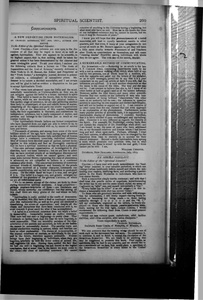< Fraudus and Tests (continued from page 1-35) >
against all brutal tests and precautions; but I say now, and once for all, that any medium who will not consent to the adoption of such harmless but efficacious methods as will render his good-faith perfectly apparent, and seal the phenomena occurring in his presence with the stamp of genuineness, is, if not a swindler, at least of little value towards enlightening and correcting public opinion on this momentus question of spiritual intercourse.
Love's Sovereignty
Though Love loves well all things of outward grace |
| John G. Saxe. |
<Untitled> (It is rumored that one or more Oriental Spiritualists)
It is rumored that one or more Oriental Spiritualists of high rank have just arrived in this country. They are said to possess a profound knowledge of the mysteries of illumination, and it is not impossible that they will establish relations with those whom we are accustomed to regard as the leaders in Spiritualistic affairs. If the report be true, their coming may be regarded as a great blessing; for after a quarter century of phenomena, we are almost without a philosophy to account for them or control their occurrence. Welcome to the Wise Men of the East, if they have really come to worship at the cradle of our new Truth.
A New Departure from Materialism
To the Editor of the Spiritual Scientist:
Care Frater. —Your columns are ever open to the discussion of all that may be urged in favor of, as well as against. Spiritualism. Your aim appears to be scientific, in its highest aspect, that is, that nothing shall be taken for granted unless it has been demonstrated by the clearest and most irrefragible proof. To aid your object, I enclose you the following extracts from a lecture on “The Gods of Superstition and the God of Science,” recently delivered in New York by D. M. Bennet, the Editor and Proprietor of the “Truth Seeker,” a fortnightly journal, devoted to polemical subjects, a rationalistic of rationalistic prints. Mr. Bennet is by nature a decided materialist, and I am certain you will be glad to hail so evident a disposition on his part to accept Spiritualistic Truth.
“The views here advanced upon the Deity and the mod, essentially materialistic, or Universe-alistic, as they are, do not mitigate against the belief in a future existence in spirit life. That belief is based on the theory, that, in the economy of nature, while we are developing our physical bodies in this earthly stage of existence, we are also perfecting another finer body or counterpart, of rare and subtile forms of matter, comprising all the organs and parts our cruder organizations do, and that, at the dissolution of this coarser, rudimental body, the finer organization is liberated, and commences its independent existence, but is really composed of matter, and pertains and belongs to the Universe just as much as our coarser bodies do.
“Our Spiritualistic friends believe our former companions who have departed from our sight are able to return to us, to see us and hold communication with us, by means of natural laws and forces.
“Thousands of persons, and among them some of the most brilliant minds of the age, have been paying great attention to this subject, and have become fully satisfied that all human beings have a continued, conscious, individual existence. Men of Science have devoted years of patient, earnest investigation to this subject, and feel as thoroughly convinced that we have a spiritual existence as that we have a physical.
“Our own personal opportunities of investigation in this direction, have not been extensive; but we are free to admit that we have received proofs of an intelligence disconnected with physical bodies, which we cannot ignore; and until some more rational theory, explaining this class of phenomena is advanced, we are compelled to believe in a continued existence after death. The concurrent testimony of numerous personal friends of intelligence and honesty, of the proofs they have received of a similar character, commands our candid consideration, and we feel no disposition to pooh-pooh it away. On the other hand we hope it is true, and are glad if it is. The belief is a happy one, and greatly enlarges our estimate of the grandeur of the glorious Universe, of which we are all infinitesimal parts.
“We by no means accept all the claims set forth by those styling themselves spiritual mediums. A large proportion— perhaps -nineteen-twentieths of them — are charlatans and frauds, wholly unworthy our confidence; but that among all this chaff there are many grains of the real wheat we fully believe.
“Spiritualism is justly entitled to the credit of demonstrating to mankind, that they have a dual or continued existence after this rudimental life, as well as for great aid rendered in demolishing the errors of superstition; and despite all the shams and deceptions that have been connected with it, we must concede it great merit for what it has accomplished.
“A belief in a continued existence does not imply a belief in immortality. Immortality means an endless existence. That ours had one end—a beginning—is pretty clear. That it extends no farther back than the time we were begotten, is most reasonable. That our mentality partakes of the characteristics of our parents and ancestors, as fully as our bodies do, cannot be successfully denied. The peculiar traits and mental similarities running in nations, tribes and families can have no other explanation. The theory of re-incarnation, or the eternal existence of mortals, as individuals, in the past and in the future, therefore appears untenable. Human beings have their beginning as individuals, when they arc begotten, precisely as with the lower orders of animal life, and vegetable life also. Having then, settled the fact that we Had one end—a beginning—we are forced to the logical conclusion, that at some time in the future we must come to the other—the close of individual existence. We cannot conceive of anything in the Universe having a beginning, but what must also have an end. How far in the future the close of our individual existence may be, cannot be known, but we trust it may be thousands of years.”
I know you will hope that this pronunciamente of a noted materialist, will lead to equally beneficial results in other quarters, and that even, if many of your antagonists do not accept as much as Mr. Bennett appears to, yet they will have a little more charity towards Possessors of and Teachers after Truth, as conscientious as themselves, and will cease “running mucks” Beardlike among individuals with whom they do not agree. The 11th day of the month, Mechir.
“From the Other World”
...
Editor's notes
- ↑ Love's Sovereignty by Saxe, John G.
- ↑ It is rumored that one or more Oriental Spiritualists by unknown author, Spiritual Scientist, № 12
Published by C.J. – photo in “Golden Book,” p. 11, and in “Early History of the T.S.,” Theos. of ... 1922.. – Archivist - ↑ A New Departure from Materialism by Sotheran, Charles, Spiritual Scientist, v. 2, No. 25, August 26, 1875, p. 299
- ↑ “From the Other World” by Olcott, H. S., Daily Graphic. Reprinted from the N. Y. Graphic, May 4 1875
Sources
-
Spiritual Scientist, v. 2, No. 25, August 26, 1875, p. 299


